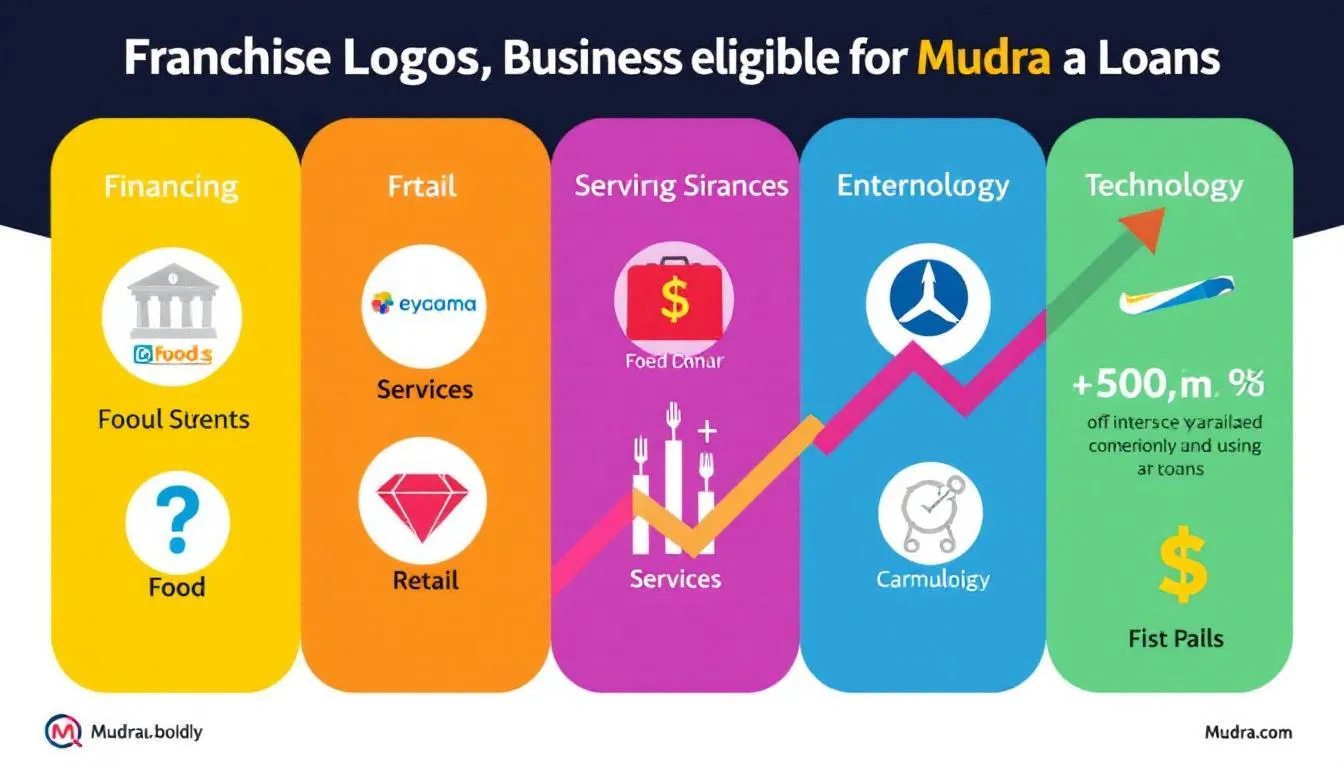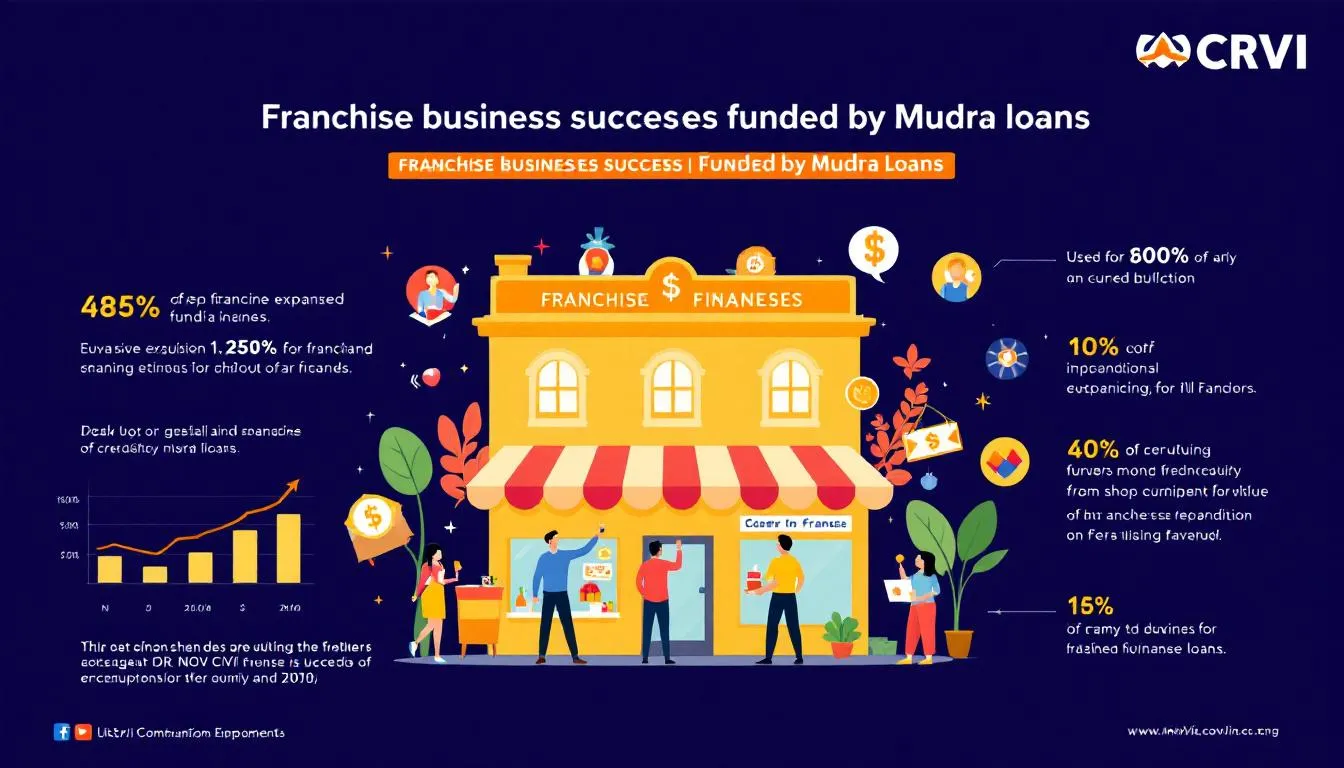Table of Contents
Want a Mudra loan for franchise business to start or grow your franchise? This guide explains how you can secure a Mudra loan for your franchise business in India, covering eligibility, application steps, and key benefits.
Key Takeaways
-
Mudra loans provide collateral-free funding of up to ₹10 lakh for franchise businesses in India, facilitating growth and expansion without the burden of traditional loan requirements.
-
The loans feature lower interest rates (8% to 12%) and flexible repayment terms, making them a cost-effective financing option for small business owners facing fluctuating income.
-
Eligibility for Mudra loans extends to various business entities, including sole proprietorships and partnerships in non-corporate sectors, while applicants must fulfill specific criteria to enhance their chances of approval.
Introduction to Pradhan Mantri Mudra Yojana
The Pradhan Mantri Mudra Yojana (PMMY) is a flagship initiative by the Government of India aimed at empowering small business owners and micro enterprises with easy access to finance. Launched in 2015, this scheme is designed to foster entrepreneurship and support business development by providing collateral-free loans through a wide network of financial institutions. Whether you are a new entrepreneur or looking to expand your existing small business, PMMY offers loans up to ₹10 lakh, making it an ideal solution for non-corporate, non-farm enterprises.
The scheme is implemented through a variety of lending partners, including commercial banks, small finance banks, cooperative banks, and microfinance institutions. This extensive network ensures that even the smallest businesses in remote areas can benefit from the scheme. By simplifying the process of obtaining business loans, the Pradhan Mantri Mudra Yojana has become a cornerstone for entrepreneurs seeking to grow their businesses and contribute to India’s economic development.
Introduction to Pradhan Mantri Mudra Yojana
The Pradhan Mantri Mudra Yojana (PMMY) is a flagship initiative by the Government of India aimed at empowering small business owners and micro enterprises with easy access to finance. Launched in 2015, this scheme is designed to foster entrepreneurship and support business development by providing collateral-free loans through a wide network of financial institutions. Whether you are a new entrepreneur or looking to expand your existing small business, PMMY offers loans up to ₹10 lakh, making it an ideal solution for non-corporate, non-farm enterprises.
The scheme is implemented through a variety of lending partners, including commercial banks, small finance banks, cooperative banks, and microfinance institutions. This extensive network ensures that even the smallest businesses in remote areas can benefit from the scheme. By simplifying the process of obtaining business loans, the Pradhan Mantri Mudra Yojana has become a cornerstone for entrepreneurs seeking to grow their businesses and contribute to India’s economic development.
Understanding Mudra Loan for Franchise Business

The Mudra loan scheme, initiated by the Government of India, is a lifeline for small businesses and micro-enterprises. It aims to facilitate funding for starting or expanding businesses without the need for collateral, making it accessible to many entrepreneurs who can’t secure traditional loans. This scheme is available to various legal entities, including individual business owners and partnerships engaged in income-generating activities, including microfinance institutions. The scheme is specifically designed to support the beneficiary micro unit at various stages of development and growth.
Micro and small enterprises, including franchise businesses, can avail of Mudra loans to fund their operations. Under the Pradhan Mantri Mudra Yojana, borrowers can access collateral-free loans up to ₹10 lakh, divided into three categories: Shishu loans (up to ₹50,000), Kishore (₹50,001 to ₹5 lakh), and Tarun (₹5 lakh to ₹10 lakh), including options starting from rs 10. This tiered approach ensures that businesses at different stages of growth can find suitable financial support through Shikhar Microfinance Pvt, India infoline finance, micro finance institution, Suryodaya Microfinance Ltd, esaf micro finance, Sakthi Finance, and Shriram Finance Corporation Pvt. The borrower refers to the micro or small entrepreneur seeking the loan. Eligible business activities include manufacturing, services, and trading, all of which can benefit from Mudra loans.
Franchise businesses are rapidly gaining popularity in India, particularly in sectors requiring low investments. Despite this growth, many aspiring entrepreneurs express uncertainty about how to finance their franchise ventures under the Mudra loan program. This guide seeks to clarify the process and offer clear, actionable steps to secure a Mudra loan for your franchise business.
Benefits of Mudra Loans for Franchise Businesses

No Collateral Requirement: One of the most significant advantages of Mudra loans is the absence of collateral, making them accessible to many entrepreneurs who do not have substantial assets to pledge.
Lower Interest Rates: The interest rate for Mudra loans typically ranges from 8% to 12%, which are lower interest rates than the market average. This makes Mudra loans a cost-effective financing option for small business owners.
Flexible Repayment Terms: Repayments are usually structured in Equated Monthly Installments (EMIs), allowing small businesses to manage their cash flows effectively. This flexibility is crucial for businesses that experience seasonal variations in income or are in the early stages of growth, especially with esskay auto finance options.
Support for Business Expansion: Mudra loans can significantly aid franchise businesses in scaling their operations. They help entrepreneurs upgrade their facilities, purchase new equipment, or even open additional franchise units by providing the necessary funds to expand and modernize. Mudra loans also provide essential capital for franchise businesses to cover expenses such as franchise fees, equipment, and operational costs. Additionally, these loans can help cover startup costs for new franchise businesses, making it easier for entrepreneurs to launch their ventures.
Streamlined Government Support: Government initiatives have streamlined the funding process, making it easier for small businesses to access the financial support they need.
Eligibility Criteria for Franchise Businesses
Eligible Entities: Borrowers can be individuals, proprietorships, partnerships, or small private limited companies. The franchise must operate in non-corporate, non-farm sectors and be an independent small business, not a corporate branch.
Debt-Free Status: Applicants must have no outstanding debts with banks or financial institutions.
Relevant Skills and Experience: Demonstrating the necessary skills or experience to run the franchise business effectively is crucial.
Educational Qualifications: Educational requirements may vary based on the business type but are important for eligibility.
Franchise Knowledge: A thorough understanding of franchise operations enhances the loan application’s strength.
Exclusion of MLM Businesses: Multi-level marketing (MLM) franchises are not eligible for Mudra loans.
Awareness of Criteria: Being aware of the eligibility criteria helps avoid confusion and prepares a stronger application.
Types of Franchise Businesses Eligible for Mudra Loans

-
Diverse Business Entities: Various types of franchise businesses are eligible for Mudra loans, including sole proprietorships, partnership firms, and small private limited companies. These entities can operate in diverse sectors, providing ample opportunities for aspiring entrepreneurs to find their niche.
-
Retail and Manufacturing: Eligible businesses include shopkeepers, vendors, and small manufacturing units, catering to a wide range of product-based enterprises.
-
Service Sector Units: Franchise businesses such as beauty salons, repair shops, and other service-oriented units qualify for Mudra loans, supporting service industry growth.
-
Food Service Industry: Small food stalls, canteens, and franchise businesses within the food service sector are eligible, helping culinary entrepreneurs access funding.
-
Transportation Businesses: Businesses operating vehicles for goods and passenger transport can apply, enabling expansion in the logistics and transport sectors.
-
Artisans and Craftsmen: Artisans engaged in traditional crafts and textile work are also eligible, promoting cultural and local craftsmanship.
-
New Businesses: Mudra loans are also designed to support new businesses looking to enter the franchise sector, fostering entrepreneurship and job creation.
-
Loan Categories for Different Needs: The Mudra loan scheme offers Shishu, Kishore, and Tarun categories to cater to various funding needs, from startups to business expansion services.
-
Support from Financial Institutions: Franchise businesses can access loans through institutions like Shriram Transport Finance, ensuring availability of financial support tailored to their sector.
Required Documentation for Mudra Loan Application
1. Valid Photo ID: A government-issued photo identification document is essential for identity verification.
2. Proof of Current Address: Documents such as utility bills or rental agreements to confirm your current place of residence.
3. Income Proof: Latest Income Tax Return (ITR) or other financial documents demonstrating your income.
4. Recent Bank Statements: Bank statements from the last six months to verify your financial transactions and stability.
5. Ownership Proof: Documents proving ownership of the residence or business premises, establishing your stake in the property.
6. Trade References: Letters or contacts from business associates to support your application’s credibility.
7. Franchise Agreement or Letter of Intent (LOI): Official documents showing your business relationship with the franchisor.
8. KYC Documents: Know Your Customer documents required by banks or financial institutions for compliance.
9. Equipment Quotations: Detailed quotations for any equipment or machinery you intend to purchase with the loan.
10. Detailed Business Plan: A comprehensive plan outlining your business model, financial projections, and how the loan will be utilized.
11. Collateral Documents (if applicable): Although Mudra loans are generally collateral-free, provide collateral or security documents if the lender requires them, as some institutions may ask for security depending on the loan amount and their policies.
Ensuring that all these documents are accurate and complete can significantly streamline the loan application process and improve your chances of approval.
Loan Amount and Tenure
Under the Pradhan Mantri Mudra Yojana (PMMY), the loan amount available to beneficiary micro units and entrepreneurs ranges from ₹50,000 to ₹10 lakh. The scheme is structured to address the diverse funding needs of micro enterprises at different stages of growth. The three loan products—Shishu, Kishore, and Tarun—are tailored to support businesses from their initial setup to expansion phases. Shishu loans cater to startups with funding needs up to ₹50,000, Kishore loans support growing businesses with requirements between ₹50,001 and ₹5 lakh, and Tarun loans are designed for established enterprises seeking up to ₹10 lakh for further expansion.
The tenure for Mudra loans typically spans from 3 to 5 years, depending on the loan amount and the repayment terms agreed upon with the lender. This flexible tenure allows entrepreneurs to manage their cash flows effectively while focusing on business growth. By offering a range of loan amounts and adaptable repayment periods, the scheme ensures that micro enterprises and small businesses have the financial support they need to expand operations, invest in assets, and create new employment opportunities.
Role of Microfinance Institutions
Microfinance institutions are pivotal in extending the reach of the Pradhan Mantri Mudra Yojana (PMMY) to small business owners and micro enterprises across India. These institutions specialize in providing financial services—including Mudra loans, savings, and insurance products—to entrepreneurs who may not have access to traditional banking channels. With the authority to lend up to ₹10 lakh to eligible borrowers, microfinance institutions play a vital role in bridging the funding gap for small businesses.
Prominent microfinance institutions such as Esskay Auto Finance, Vistaar Financial Services, and Suryodaya Microfinance Ltd are actively involved in disbursing Mudra loans. Their strong presence in rural and semi-urban regions enables them to reach a wide network of small business owners, supporting the growth of micro enterprises and fostering local entrepreneurship. By offering tailored financial products and personalized services, these institutions help entrepreneurs access the funds they need to start, sustain, or expand their businesses under the Mudra loan scheme.
Loan Amount and Tenure
Under the Pradhan Mantri Mudra Yojana (PMMY), the loan amount available to beneficiary micro units and entrepreneurs ranges from ₹50,000 to ₹10 lakh. The scheme is structured to address the diverse funding needs of micro enterprises at different stages of growth. The three loan products—Shishu, Kishore, and Tarun—are tailored to support businesses from their initial setup to expansion phases. Shishu loans cater to startups with funding needs up to ₹50,000, Kishore loans support growing businesses with requirements between ₹50,001 and ₹5 lakh, and Tarun loans are designed for established enterprises seeking up to ₹10 lakh for further expansion.
The tenure for Mudra loans typically spans from 3 to 5 years, depending on the loan amount and the repayment terms agreed upon with the lender. This flexible tenure allows entrepreneurs to manage their cash flows effectively while focusing on business growth. By offering a range of loan amounts and adaptable repayment periods, the scheme ensures that micro enterprises and small businesses have the financial support they need to expand operations, invest in assets, and create new employment opportunities.
Role of Microfinance Institutions
Microfinance institutions are pivotal in extending the reach of the Pradhan Mantri Mudra Yojana (PMMY) to small business owners and micro enterprises across India. These institutions specialize in providing financial services—including Mudra loans, savings, and insurance products—to entrepreneurs who may not have access to traditional banking channels. With the authority to lend up to ₹10 lakh to eligible borrowers, microfinance institutions play a vital role in bridging the funding gap for small businesses.
Prominent microfinance institutions such as Esskay Auto Finance, Vistaar Financial Services, and Suryodaya Microfinance Ltd are actively involved in disbursing Mudra loans. Their strong presence in rural and semi-urban regions enables them to reach a wide network of small business owners, supporting the growth of micro enterprises and fostering local entrepreneurship. By offering tailored financial products and personalized services, these institutions help entrepreneurs access the funds they need to start, sustain, or expand their businesses under the Mudra loan scheme.
Steps to Apply for Mudra Loan for Franchise Business
1. Research Suitable Loan Schemes: Begin by understanding the different categories of Mudra loans—Shishu, Kishore, and Tarun—and identify which category aligns best with your franchise business needs.
2. Prepare Necessary Documents: Collect and organize all required documents, including your franchise agreement, cost sheet, and other supporting papers. Ensure accuracy and completeness to avoid delays or rejection.
3. Complete the Loan Application: Fill out the loan application form carefully, providing all requested information accurately.
4. Submit Application and Documents: Submit your completed application along with the prepared documents to the chosen bank or financial institution.
5. Follow Up on Application: Maintain communication with the lender to track the status of your application and provide any additional information if requested.
6. Await Approval and Disbursement: Once approved, the loan amount will be disbursed to your account, enabling you to start or expand your franchise business.
Tips for Improving Mudra Loan Approval Chances
Comprehensive Business Plan: A well-prepared business plan outlining how you intend to use the funding and your repayment strategies can persuade lenders of your loan’s viability. Registering your business on the Udyam portal can enhance your credibility and improve trust among lenders at Future Financial Services Ltd.
Document Consistency: Consistency in your documents is crucial. Ensure that names and addresses match across different identification and utility bills to prevent your application from being rejected.
Credit Report Management: Address credit issues early by checking your CIBIL report. Resolve any disputes on your credit report before applying to avoid delays or rejection.
Bank Relationship: Apply through commercial banks where you already maintain an account to increase trust and approval chances.
Active Follow-Up: Regularly follow up with the bank after submitting your application to ensure transparency and accountability.
Financial Advisor Consultation: Consult with a financial advisor for guidance on loan applications to improve your chances of success.
Common Mistakes to Avoid When Applying for Mudra Loan
Applying for a Mudra loan can be a straightforward process, but many borrowers encounter setbacks due to avoidable mistakes. One of the most common errors is submitting incomplete or inaccurate documentation, which can delay approval or lead to outright rejection. It’s essential to ensure that all required documents are up-to-date and consistent across your application.
Another frequent issue is a poor credit history. Before applying, review your credit report and resolve any discrepancies to improve your eligibility. Additionally, lacking a clear and detailed business plan can make it difficult for banks or financial institutions to assess your business’s viability. Make sure your business plan outlines your objectives, funding needs, and repayment strategy.
Borrowers should also carefully review the loan’s interest rate, repayment terms, and any collateral requirements—even though Mudra loans are generally collateral-free, some lenders may have specific conditions. Meeting all eligibility criteria and understanding the terms will help you avoid surprises down the line.
Finally, always approach reputable lenders such as public sector banks or established microfinance institutions to ensure a smooth and efficient loan sanctioning process. By steering clear of these common mistakes, you can enhance your chances of securing the funds needed to expand your business and achieve your entrepreneurial goals.
Common Mistakes to Avoid When Applying for Mudra Loan
Applying for a Mudra loan can be a straightforward process, but many borrowers encounter setbacks due to avoidable mistakes. One of the most common errors is submitting incomplete or inaccurate documentation, which can delay approval or lead to outright rejection. It’s essential to ensure that all required documents are up-to-date and consistent across your application.
Another frequent issue is a poor credit history. Before applying, review your credit report and resolve any discrepancies to improve your eligibility. Additionally, lacking a clear and detailed business plan can make it difficult for banks or financial institutions to assess your business’s viability. Make sure your business plan outlines your objectives, funding needs, and repayment strategy.
Borrowers should also carefully review the loan’s interest rate, repayment terms, and any collateral requirements—even though Mudra loans are generally collateral-free, some lenders may have specific conditions. Meeting all eligibility criteria and understanding the terms will help you avoid surprises down the line.
Finally, always approach reputable lenders such as public sector banks or established microfinance institutions to ensure a smooth and efficient loan sanctioning process. By steering clear of these common mistakes, you can enhance your chances of securing the funds needed to expand your business and achieve your entrepreneurial goals.
Challenges in Obtaining Mudra Loans for Franchise Businesses
1. Credit History Issues: Franchise businesses often face difficulties due to poor or insufficient credit history, which can affect loan approval chances.
2. Document Submission Delays: Incomplete or scattered submission of required documents can cause delays in the loan processing, especially when covering loans.
3. Lack of Collateral or Guarantor Support: Many franchise owners struggle to provide adequate collateral or guarantor support, which may hinder obtaining Mudra loans.
4. Perceived Risk by Banks: Banks may hesitate to fund franchise businesses due to perceived risks associated with their operations, impacting loan availability.
5. Lack of Understanding of Loan Process: A poor understanding of the Mudra loan application process can lead to errors or missed opportunities, reducing the chances of approval.
6. Preparation and Awareness: Despite these challenges, being well-prepared, understanding eligibility criteria, and following the loan process carefully can significantly improve approval chances.
Success Stories of Franchise Businesses Funded by Mudra Loans

Success stories of franchise businesses funded by Mudra loans serve as inspiration for aspiring entrepreneurs. One such example is a woman who opened an Agarbatti franchise with the help of a Mudra loan, demonstrating how accessible funding can transform dreams into reality.
A college dropout successfully started a herbal cosmetic franchise using Mudra loan funding, serving as another inspiring example of Vistaar Financial Services. These stories highlight the potential for aspiring entrepreneurs to achieve their dreams with the help of Mudra loans.
These success stories not only provide motivation but also illustrate the practical benefits and opportunities that Mudra loans offer to franchise businesses.
Summary
In summary, Mudra loans offer a viable and accessible financing option for franchise businesses in India. By understanding the benefits, eligibility criteria, required documentation, and application steps, aspiring entrepreneurs can confidently navigate the process of securing a Mudra loan.
The success stories highlighted in this guide underscore the transformative potential of Mudra loans. With the right preparation and understanding, you too can leverage this financial support to turn your franchise business dreams into reality.
Frequently Asked Questions
What types of franchise businesses are eligible for Mudra loans?
Mudra loans are available for various franchise businesses, such as sole proprietorships, partnership firms, small private limited companies, service units, food stalls, transportation businesses, and traditional craft artisans. This broad eligibility allows diverse entrepreneurs to seek funding for their ventures.
What are the different categories of Mudra loans?
Mudra loans are classified into three categories: Shishu (up to ₹50,000), Kishore (₹50,001 to ₹5 lakh), and Tarun (₹5 lakh to ₹10 lakh), addressing different funding requirements from startups to business growth.
What documents are required to apply for a Mudra loan?
To apply for a Mudra loan, you need to provide a valid photo ID, proof of current address, income proof, recent bank statement, ownership proof of residence or business premises, trade references, a franchise agreement or Letter of Intent, along with a detailed business plan. Ensure all documents are readily available to streamline the application process.
How can I improve my chances of getting a Mudra loan?
To enhance your chances of obtaining a Mudra loan, it is crucial to prepare a comprehensive business plan, register your business on the Udyam portal, maintain consistency in your documentation, proactively address any credit issues, apply through established banks, and consistently follow up with the lending institution.
What are some challenges in obtaining Mudra loans for franchise businesses?
Obtaining Mudra loans for franchise businesses is challenging due to issues like credit history, insufficient collateral, and a lack of understanding of the loan process, alongside banks perceiving higher risks associated with franchise operations. Addressing these challenges is crucial for successful loan acquisition.
- Rejected Mudra Loan – What to Do Next? Appeal Process Explained
- Mudra Loan for Used Vehicle: Benefits, Interest Rates, and Eligibility Criteria
- Is the Mudra Loan Subsidy Real or Fake? Get the Facts Here
- Get Your Mudra Loan Approved: Write a Perfect Project Report with This Guide
- Mudra Loan Without CIBIL Score: How to Qualify and Apply
- Mudra Loan Without PAN Card: Eligibility & Application Process Explained
- Secure Your Future: Mudra Loan for Salaried Person Explained
- Mudra Loan for Senior Citizens or Retired Persons – Eligibility, Benefits & Myths
- Mudra Loan for Disabled Persons: Eligibility, Interest Rates, and Benefits
- Best Tips for Securing a Mudra Loan for SC ST Applicants
- Top Benefits of Mudra Loan for Women Entrepreneurs
- How to Get Mudra Loan for Franchise Business in India
- Mudra Loan for Home Business: How to Apply and Benefits
- Can I Get Mudra Loan Without GST or Udyam Registration?
- Mudra Loan for Amazon Seller, Dropshipping, and Affiliate Marketing – Is It Possible?
- Best Mudra Loan for Housewives – Empowering Women Across India
- Top Reasons for Mudra Loan Rejected and How to Fix Them
- Best Business Idea Under Mudra Loan 5 Lakh for 2025
- Mudra Loan for Used Machine: Eligibility, Interest Rates & Benefits



















